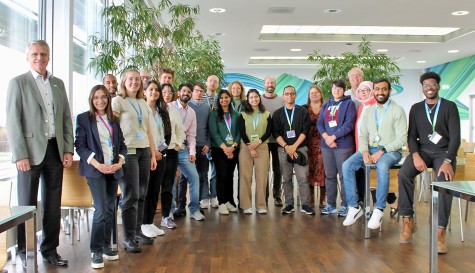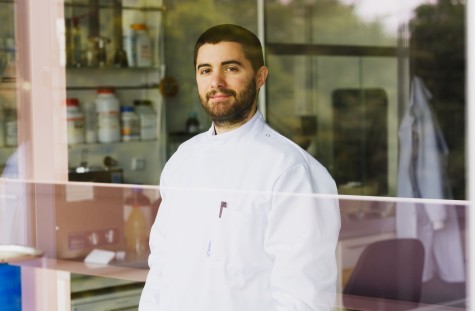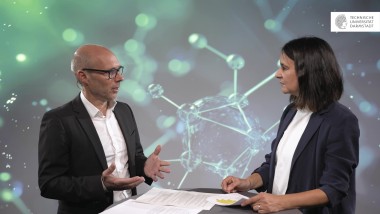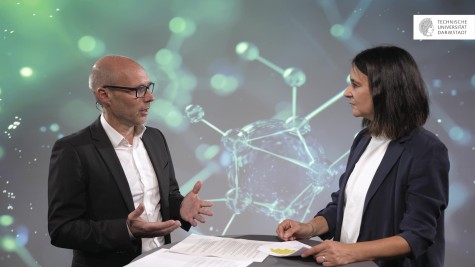-
![]() Picture: Centre for Synthetic Biology
Picture: Centre for Synthetic Biology![]() Picture: Centre for Synthetic Biology
Picture: Centre for Synthetic BiologySuccessful concepts with biomaterials ryon Summer School under the motto ‘From idea to start-up’
2024/11/04
The 2nd ryon Start-Up Summer School took place in Darmstadt in October 2024. Participants had the opportunity to take a look into the future of synthetic biology. Over five varied days, the international participants learnt a lot about business models and how to develop a business model from an idea into a professional pitch deck in just a few days. This year's event focussed on the topic of biomaterials in the context of the ‘CoM2Life’ cluster project, which is in the running for a top cluster in the renowned Excellence Strategy of the German federal and state governments.
-
![Porträtbild Dr. Anna C. Bakenecker]() Picture: Fraunhofer IMTE
Picture: Fraunhofer IMTE![Porträtbild Dr. Anna C. Bakenecker]() Picture: Fraunhofer IMTE
Picture: Fraunhofer IMTEMicrorobots for drug transport
2024/10/28
LOEWE Start Professorship: Anna C. Bakenecker receives two million euros
Dr Anna C. Bakenecker has been awarded a LOEWE Start Professorship at TU Darmstadt. The expert in medical physics is working on the development, control and monitoring of nano- and microrobots that are designed to transport drugs to their target sites in the body. The LOEWE research funding programme of the state of Hesse is providing around two million euros over a period of six years.
-
![]() Picture: RMU
Picture: RMU![]() Picture: RMU
Picture: RMU“Let's shape the future together”
2024/10/18
6th RMU Day on 27 November 2024 at the Gutenberg Campus Mainz
The Presidents of the Rhine-Main Universities (RMU) cordially invite you to the 6th RMU Day. This year, the Rhine-Main Universities Day will focus on the RMU’s joint proposal as a consortium in the Excellence Strategy of the German federal and state governments.
-
![Dr. Andrea Belluati]() Picture: Katrin Binner
Picture: Katrin Binner![Dr. Andrea Belluati]() Picture: Katrin Binner
Picture: Katrin BinnerHarnessing the strengths of two worlds
2024/10/15
Biotechnologist Andrea Belluati to lead new Emmy Noether group
A fascinating fusion of two worlds: A new Emmy Noether research group at TU Darmstadt focuses on hybrid systems that combine artificial and living cells to achieve functions that neither can perform alone. Biotechnologist Andrea Belluati is funded by the German Research Foundation (DFG) with 1.8 million euros for his project “Polymer Incorporation for the Engineering of Symbiosis” over the next six years. The newly designed hybrid systems might come to task in more effective drug delivery or sustainable biofuel production.
-
![]()
![]()
How humans react to change
2024/10/07
Professor Constantin Rothkopf, Darmstadt spokesman for the TAM cluster project, in a video interview
Researchers working on ‘The Adaptive Mind’ (TAM) project can hope for the approval of a prestigious Cluster of Excellence. Professor Rothkopf explains what’s behind the project on the adaptability of the human mind. Third and final part of a video series on TU Darmstadt's three Cluster of Excellence applications.
-
![]()
![]()
Research for a more sensible AI
2024/10/01
An interview with Professor Kristian Kersting and Professor Markus Rohrbach, co-speakers of the RAI cluster project
The research initiative „Reasonable Artificial Intelligence’ (RAI) is one of three projects involving TU Darmstadt that are in the running for a Cluster of Excellence. Professor Kersting and Professor Rohrbach give an insight into their research – and explain who could benefit from it in the future. Part two of a three-part video series on TU Darmstadt's Cluster of Excellence applications.
-
![]()
![]()
Communicating biomaterials
2024/09/25
Professor Heinz Koeppl, Darmstadt spokesman of the project ‘CoM2Life’, in a video interview
The cluster initiative ‘COM2Life’ is a project within the framework of the Rhine-Main Universities (RMU), with TU Darmstadt and Johannes Gutenberg University Mainz as partners. Professor Koeppl introduces the research project, which aims to develop a new generation of soft biomaterials. Part one of a three-part video series on TU Darmstadt's Cluster of Excellence applications.
-
![]() Picture: Igor - adobe.stock.com/Patrick Bal/Katrin Binner
Picture: Igor - adobe.stock.com/Patrick Bal/Katrin Binner![]() Picture: Igor - adobe.stock.com/Patrick Bal/Katrin Binner
Picture: Igor - adobe.stock.com/Patrick Bal/Katrin BinnerERC Starting Grant for two “RAI” researchers
2024/09/11
Projects on learning robotic systems and digital 3D doppelgangers selected
In the current funding round of the European Research Council (ERC), four projects at TU Darmstadt have been awarded a Starting Grant. Two of these went to researchers from the “Reasonable Artificial Intelligence” (RAI) project. “RAI” is in the running for a Cluster of Excellence in the prestigious Excellence Strategy of the German federal and state governments.
-
![]() Bild: Klaus Mai
Bild: Klaus Mai![]() Bild: Klaus Mai
Bild: Klaus MaiKonsularischer Besuch im Wissenschaftsschloss
2024/09/04
Hessisches Consular Corps zu Gast an der TU Darmstadt
Die TU Darmstadt hat gestern (3. September) das Hessische Consular Corps im Wissenschaftsschloss begrüßt. Zu Gast waren rund 90 internationale Konsuln und Konsulinnen. Auf dem Programm standen unter anderem wissenschaftliche Vorträge und Präsentationen aus dem Bereich der Künstlichen Intelligenz (KI) sowie eine Führung durch das Schloss.
-
![]() Bild: Klaus Mai
Bild: Klaus Mai![]() Bild: Klaus Mai
Bild: Klaus MaiIm Dialog
2024/09/02
Bundestagsabgeordneter Kai Gehring zu Gast an der TU Darmstadt
Im Rahmen seiner Sommertour nahm sich der Bundestagsabgeordnete Kai Gehring (Bündnis 90/Die Grünen), Vorsitzender des Bundestagsausschusses für Bildung, Forschung und Technikfolgenabschätzung, am Mittwoch, den 28. August, Zeit für einen Besuch an der TU Darmstadt. Im Mittelpunkt des Besuchs stand der Austausch mit verschiedenen Statusgruppen der Universität und die Information der Delegation über die eingereichten Exzellenzclustern und zentralen Forschungsinitiativen. Begleitet wurde er von seinen hessischen Parteikolleg:innen Hildegard Förster-Heldmann, Mitglied des Hessischen Landtags und Andreas Ewald, Landesvorsitzender der Grünen in Hessen. Die Gäste wurden von TU-Kanzler Dr. Martin Lommel und den Vizepräsident:innen Professorin Franziska Lang sowie Professor Matthias Oechsner auf dem Campus Lichtwiese willkommen geheißen.
All news on the Excellence Strategy
All news on the Excellence Strategy






















